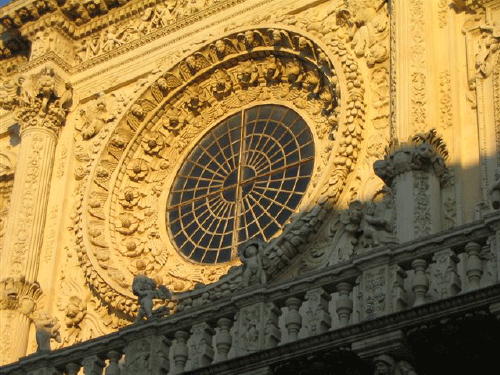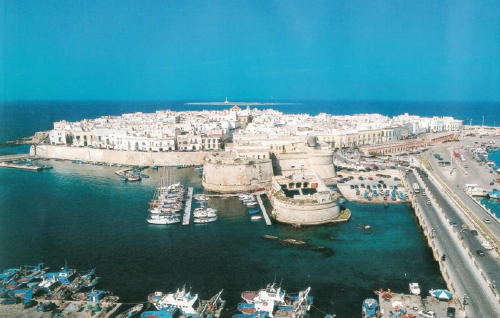
Program Fees and Accommodations
Sample itineraries and labs
Otranto, Puglia
Studia l'Italiano e Scopri la
Cultura del Mediterraneo
Study Italian and Discover
Mediterranean Culture
Sample Itineraries included in the program fee
Salento area
Lecce. Lecce is the most important city of the Salento area and it is famous for its rich Baroque architecture, thanks to which it's also called "The Florence of the South". Lecce is also known for its production of ceramic and sculpture made with the so called "Lecce stone". The historical area which we will visit, is also filled with restaurants, pubs, cafes, gelaterie and little stores. In Lecce we will also have a lab of "cartapesta" (papier mache/paper pulp), a traditional artistic production for which the city is well known.

Galatina. You can be in this wonderful town of Greek origins and traditions and visit Santa Caterina d'Alessandria, a wonderful church of "stile romanico pugliese" (Apulian Romanesque style) considered a national monument since 1866. Besides the carved stone work of the facade, you can admire the magnificent frescos which go back to the school of Giotto.
Gallipoli. Considered one of the most beautiful costal towns of Italy (it's name comes from the Greek "Beautiful City"), Gallipoli is famous for its historical monuments, the great Mediterranean cuisine and the beautiful beaches. Unique is the old part of the town, which is a calcareous island connected to the land by a bridge (see picture below).

Santa Cesarea Terme. You will enjoy the iodine-sulphur water of the thermal springs of Santa Cesarea Terme. The springs are in four grottos which are directly connected to the sea.

Santa Maria di Leuca. The southeastern extremity of the "heel" of the Italian peninsula, Santa Maria di Leuca offers a breathtaking landscape which you will remember for the rest of your life. The crystal-clear sea is also the meeting point of the waters of the Ionian Sea and the Adriatic Sea.

Alberobello. Alberobello with its famous stone houses called trulli is a unique town which has been declared an International Human Resource by UNESCO.

Ostuni. Ostuni, also called Città Bianca (White Town) for the the dazzling effect of its white houses, will offer you the opportunity to walk in a fabulous Mediterranean space surrounded by historical churches, palaces, monuments and by the dense blue color of the Adriatic Sea.

Grottaglie. A very old city which roots go back to the Paleolithic era, Grottaglie is located on the Ionian Sea. The city is famous for its history, monuments and especially for the craftsmanship and the Museum of Ceramics.
Basilicata and Campania Regions: excursions included in the program fee
Weekend on the Pollino Mountain. The group will leave Otranto on a Friday morning and on the way we will see Monte Cotugno, where one can admire the biggest dam/artificial lake of Europe. Then they will go to visit Matera, well known city protected by UNESCO for its stone houses and its culture. In the afternoon there will be a guided excursion on the Pollino Mountains, where you can see and touch the pino loricato, an Ice Age tree which exists only in this area of Italy and in the Balkans. The excursion includes a stop at a workshop of "fragolino", the delicious liquor made with wild strawberries typical of this area. At night there will be dinner at local restaurant.
On Saturday it is scheduled the visit of the Certosa di Padula, one of the biggest Carthusian monastery of Europe and then the fantastic visit of the Grotte di Pertosa with the life show of Dante's Inferno. Here, under the vigilant guide of Dante we will make our journey through Hell. The trip starts on the Boat of Charon over the black river Negro (symbolizing the Acheron) which will carry us in front of the doors of Hell. Accompanied by Dante's and his guide Virgil we will assist to a wonderful representation of the main episodes and characters of Inferno, from the confessions of the sins to the judge of Hell Minos, to the eternal love of Paolo and Francesca, from the last trip of the famous Greek hero Ulysses, to the sorrow of Count Ugolino della Gherardesca for his death and the death of his sons. For more information on the representation of Inferno at the Grotte di Pertosa visit www.tappetovolante.org/dante/scheda.php
On Sunday morning there will be the possibility of practicing some sports such as climbing, mountain bike, trekking, or rafting. For the latest, we have to reach the river Lao where those who are interested can go rafting (the rates, which include also the full equipment, are the following: 15 Euros per person for 1 hour; 45 Euros per person for 3 hours). For rafting and other sports on fiume Lao please visit www.laocanoa.it ).
Please notice that the fee for the rafting must be paid directly to the local organization and not to the De Rada Institute, which is not responsible for it.
For more information on the above locations please visit the official web sites of the towns: Galatina, Gallipoli, Santa Cesarea Terme, Santa Maria di Leuca, Alberobello, Ostuni, Grottaglie, Monte Cotugno, Chiaromonte.

Laboratories included in the program fee
Pizzica and Tamburello: You will learn how to play il tamburello and how to dance la pizzica, the typical dance of the Salento area accompanied by the rhythm of the tamburello (drum);
Cartapesta: Learn the technique of the papier-mache (painted paper) and make puppets, boxes and various objects for you and your friends.
Cucina Salentina: You can learn from professional chefs how to prepare the delicious homemade fresh pasta of Puglia, together with the typical sauces, meat and fish of the Salento area.
Morever students will be able to practice Italian language in a real-life environments such as at the fruttivendolo (fruit vendor), albergo (hotel), ristorante (restaurant), panetteria (bakery), pasticceria (pastry shop-cafe`), edicola (newspaper and magazine stand), etc.
Please notice that labs are selected and scheduled at the discretion of the program director.
Traveling and transfers to Otranto not included in the program fee
You can reach
Otranto from any Italian city by train or bus, which usually make a
major
stop in Lecce, 26 miles far from Otranto. For instance if you arrive in
Rome, Bari or Brindisi you can take a train to Lecce and then a train
or a bus to Otranto (trains and buses run every hour). From Stazione Tiburtina Bus Station in Rome you can directly take one of the 3 buses of the company Marozzi, which will take you directly to Otranto.
You can reach Otranto also by landing at the Airports
of Brindisi or Bari. Buses and "navetta" are easy to take for Lecce. Transfer
from the above airports are available at the following rates: from
Brindisi to Otranto it costs 90 Euros each way for 1 to 3 passengers;
100 Euros each way for 4 to 7 passengers; 150 Euros each way for 8 to
13 passengers. Rates from Bari to Otranto are 180 Euros each way for 1
to 3 passengers; 190 Euros each way for 4 to 7 passengers; 200 Euros
each way for 8 to 13 passengers.
For train schedule and rates please visit www.ferroviedellostato.it
and www.fseonline.it
Please notice that the fee for the transfer must be paid directly to the local organization and not to the De Rada Institute, which is not responsible for it.
Register
Now!
The application and a $100 non-refundable deposit is due on April 15,
2013. The remaining tuition balance is due the first week of May, 2013.
Enrollment is limited. Late Applications may be considered. Please
email to check availability. See
application form for further
details.
| Program
Sponsors
De Rada Italian
Institute, Cambridge,
MA & Kingston, RI:
|
Contact
Information
De Rada Italian Institute tel. 857-928-3456
Coordinator in Otranto: Prof. Maria Pina Accoto Telefono 0836/801952 |
